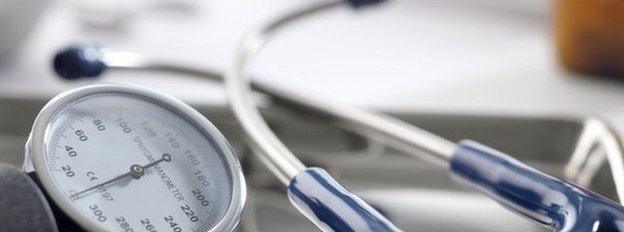Are we being fair to the NHS?
- Published

Negative headlines about the NHS abound at the moment.
This week alone there has been stories about ambulances queuing, failing GP surgeries and over-stretched maternity units.
Then on Friday it emerged the A&E waiting time target had been missed for the first time this winter.
But is the health service getting a raw deal?
The truth is the NHS in England is probably the most transparent health system in the world.
Data is available on hundreds of different metrics covering everything from the mortality rates for individual surgeons to how much each hospital spends on food - and they are all just a few clicks of the mouse away.
What is more, this is just the start.
Ministers and the senior leadership in the NHS want even more openness.
From next April, patients will be able to log on to a website to look up what the staffing levels are for each and every hospital ward in England.
This transparency is a godsend for journalists, allowing them to mine data for stories.
One needs to look no further than on the BBC News website to see that.
This week saw the launch of our A&E tracker, which is based on the blizzard of weekly statistics pumped out by NHS England.
National concern
But the greater transparency is not the only factor.
There has also been a change in mindset to poor care following the Stafford Hospital scandal.
No longer is it acceptable to argue that exceptions to the rule do not matter.
As one senior NHS manager put it to me: "There used to be the attitude if 95% or so of care was good, it was not necessarily a matter of national concern what happened in the remaining 5%. That is not the case now."
The result has been that there is now a laser-like focus on any sign of poor care.
Take, Thursday's story about GPs.
The CQC was on the look out for problems. Of the 910 practices inspected, 80% were targeted because concerns had already been flagged up.
Problems were found in about 300, but this is not the same as saying a third of GPs are failing - as was reported by some.
Another factor is the need for two of the key organisations keeping an eye on the health service to make some waves.
The Care Quality Commission - with its three new chief inspectors - is striving to show it can be a watchdog with bite after being criticised in the past for being too timid.
Meanwhile, NHS England, created in the shake-up in April, is doing much to push the transparency agenda.
But the changing landscape is not necessarily a bad thing, as Dr Johnny Marshall, of the NHS Confederation, which represents NHS trusts, explains.
"By increasing transparency, we are increasing the chances of improving care," he says.
"These problems we are seeing reported have probably been there for years, its just that we are now shining a light on them.
"It makes it pretty painful at the moment, but we are giving ourselves the best chance of success. If that happens everyone benefits."